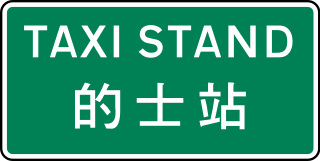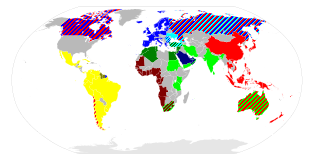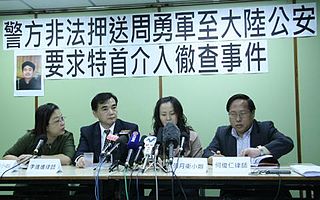
Flag of convenience (FOC) is a business practice whereby a ship's owners register a merchant ship in a ship register of a country other than that of the ship's owners, and the ship flies the civil ensign of that country, called the flag state. The term is often used pejoratively, and although common, the practice is sometimes regarded as contentious.

The Port of Hong Kong located by the South China Sea, is a deepwater seaport dominated by trade in containerised manufactured products, and to a lesser extent raw materials and passengers. A key factor in the economic development of Hong Kong, the natural shelter and deep waters of Victoria Harbour provide ideal conditions for berthing and the handling of all types of vessels. It is one of the busiest ports in the world, in the three categories of shipping movements, cargo handled and passengers carried. This makes Hong Kong a Large-Port Metropolis.

Hong Kong taxicabs provide taxi services in Hong Kong. Although a few taxis are independently owned and operated, the vast majority are owned by 17 independent taxi companies that rent out taxis on a shift basis to 40,000 self-employed drivers.

The Customs and Excise Department (C&ED) is a government agency responsible for the protection of the Hong Kong Special Administrative Region against smuggling; the protection and collection of revenue on dutiable goods on behalf of the Hong Kong Government; the detection and deterrence of drug trafficking and abuse of controlled drugs; the protection of intellectual property rights; the protection of consumer interests; and the protection and facilitation of legitimate trade and upholding Hong Kong's trading integrity.

The Marine Department of the Hong Kong Government is responsible for maintaining safety and environmental protection of the harbour, ships registered/foreign ships in Hong Kong and monitor shipping traffic in Hong Kong waters, search and rescue operations for large waters of the South China Sea.
The flag state of a merchant vessel is the jurisdiction under whose laws the vessel is registered or licensed, and is deemed the nationality of the vessel. A merchant vessel must be registered and can only be registered in one jurisdiction, but may change the jurisdiction in which it is registered. The flag state has the authority and responsibility to enforce regulations over vessels registered under its flag, including those relating to inspection, certification, and issuance of safety and pollution prevention documents. As a ship operates under the laws of its flag state, these laws are applicable if the ship is involved in an admiralty case.

Port state control (PSC) is an inspection regime for countries to inspect foreign-registered ships in port other than those of the flag state and take action against ships that are not in compliance. Inspectors for PSC are called PSC officers (PSCOs), and are required to investigate compliance with the requirements of international conventions, such as SOLAS, MARPOL, STCW, and the MLC. Inspections can involve checking that the vessel is crewed and operated in compliance with applicable international law, and verifying the competency of the ship's master and officers, and the ship's condition and equipment.
Clear The Air is a voluntary organisation aiming at reducing air pollution in Hong Kong. It was founded on 10 December 1997 as a Society under the Societies Ordinance. It is self-sustained and is supported by individual membership fees and member donations.

The history of shipping in Cyprus traces back hundreds of years. Its geographical position at the crossroads of Europe, Asia and Africa as well as its proximity to the Suez Canal has historically favoured merchant shipping as an important industry for this European island state. As of 2005 Cyprus holds the 9th largest merchant navy in the world and the 3rd largest in the European Union.

Hanjin Venezia, formerly named the Cosco Busan, is a 275 m (902 ft) container ship. On 7 November 2007, it collided with the protective fender of the Delta Tower of the San Francisco–Oakland Bay Bridge in heavy fog. The collision sliced open two of its fuel tanks and led to the Cosco Busan oil spill in San Francisco Bay. She was renamed the Hanjin Venezia after the accident.
Affreightment is a legal term relating to shipping.

The visa policy of Hong Kong deals with the requirements in which a foreign national wishing to enter Hong Kong through one of the 15 immigration control points must meet to obtain an entry permit or Visa, which depending on the traveller's nationality, may be required to travel to, enter, and remain in the Hong Kong Special Administrative Region. Visitors from over 145 countries are permitted without Visa entry for periods ranging from 7 to 180 days, to the Hong Kong Special Administrative Region for tourism or certain business-related activities. All visitors must hold a passport valid for more than 1 month.

The Hong Kong Shipping Register was set up in 1990 under the Hong Kong Merchant Shipping (Registration) Ordinance, administered by the Marine Department. Since the transfer of sovereignty by the United Kingdom in 1997, Hong Kong is authorised under the Basic Law by the Government of the People’s Republic of China, using the name “Hong Kong, China” to maintain a separate ship registration system.

The Zhou Yongjun incident was a political controversy which involved the rendition of Zhou Yongjun (周勇军), a former student activist during the 1989 Tiananmen Square protests and massacre, by the Hong Kong authorities to the People's Republic of China. Zhou attempted to enter Hong Kong from the United States via Macau using a forged Malaysian passport. Zhou's supporters alleged the renditioning to be illegal, and his lawyer, Democratic Party chairman Albert Ho, described Zhou's case as "posing the biggest challenge to the one country, two systems principle laid down in the Basic Law." The Government of Hong Kong refused to comment on individual cases, and the People's Republic of China said Zhou was detained on several charges, including one of financial fraud.
Ship management is the activity of managing marine vessels. The vessels under management could be owned by a sister concern of the ship management company or by independent vessel owners. A vessel owning company that generally has several vessels in its fleet, entrusts the fleet management to a single or multiple ship management companies. Ship management is often entrusted to third parties due to the various hassles that are involved in managing a ship. For instance, ships could be considered as large factories that travel across seas under various weather conditions for several days at a stretch. These vessels are equipped with several types of machinery that require appropriate maintenance and the associated spares on board. In the scenario of a vessel lacking adequate maintenance, this could lead to the breakdown of the equipment in the middle of a voyage at sea. A breakdown could be an expensive affair. A second scenario would be – a vessel is continuously on the move or under some sort of activity and hence requires a competent crew. The documents of the crew need to comply with international regulations, their transportation to and from the vessel must be arranged for, their competencies must align with the requirement of the vessel and must complement the skillsets of the existing onboard crew. Hence several parameters must be considered which is a tedious job.
Vessel safety surveys are inspections of the structure and equipment of a vessel to assess the condition of the surveyed items and check that they comply with legal or classification society requirements for insurance and registration. They may occur at any time when there is reason to suspect that the condition has changed significantly since the previous survey, and the first survey is generally during construction or before first registration. The criteria for acceptance are defined by the licensing or registration authority for a variety of equipment vital to the safe operation of the vessel, such as safety equipment, lifting equipment, hull structure, static stability, ground tackle, propulsion machinery, auxiliary machinery, etc. The SOLAS Convention, specifies safety equipment for commercial vessels operating internationally.
Seaworthiness is a concept that runs through maritime law in at least four contractual relationships. In a marine insurance voyage policy, the assured warrants that the vessel is seaworthy. A carrier of goods by sea owes a duty to a shipper of cargo that the vessel is seaworthy at the start of the voyage. A shipowner warrants to a charterer that the vessel under charter is seaworthy; and similarly, a shipbuilder warrants that the vessel under construction will be seaworthy.

The Companies Registry is a government department under the Financial Services and the Treasury Bureau of the Government of Hong Kong. Its responsibilities include the registration of Hong Kong companies and non-Hong Kong companies under the Companies Ordinance, open-ended fund companies under the Securities and Futures Ordinance and limited partnership funds under the Limited Partnerships Funds Ordinance. It administers the licensing regime for trust and corporate service providers under the Anti-Money Laundering and Counter-Terrorist Financing Ordinance as well as the licensing regime for money lenders under the Money Lenders Ordinance.

SS Fatshan was a passenger ferry steamer which sank in stormy seas off Lantau Island during Typhoon Rose resulting in the loss of 88 lives.

Environment and Ecology Bureau is one of the fifteen policy bureau of the Government of Hong Kong. The agency was established on 1 July 2022. The current Secretary for Environment and Ecology is Tse Chin-wan.












